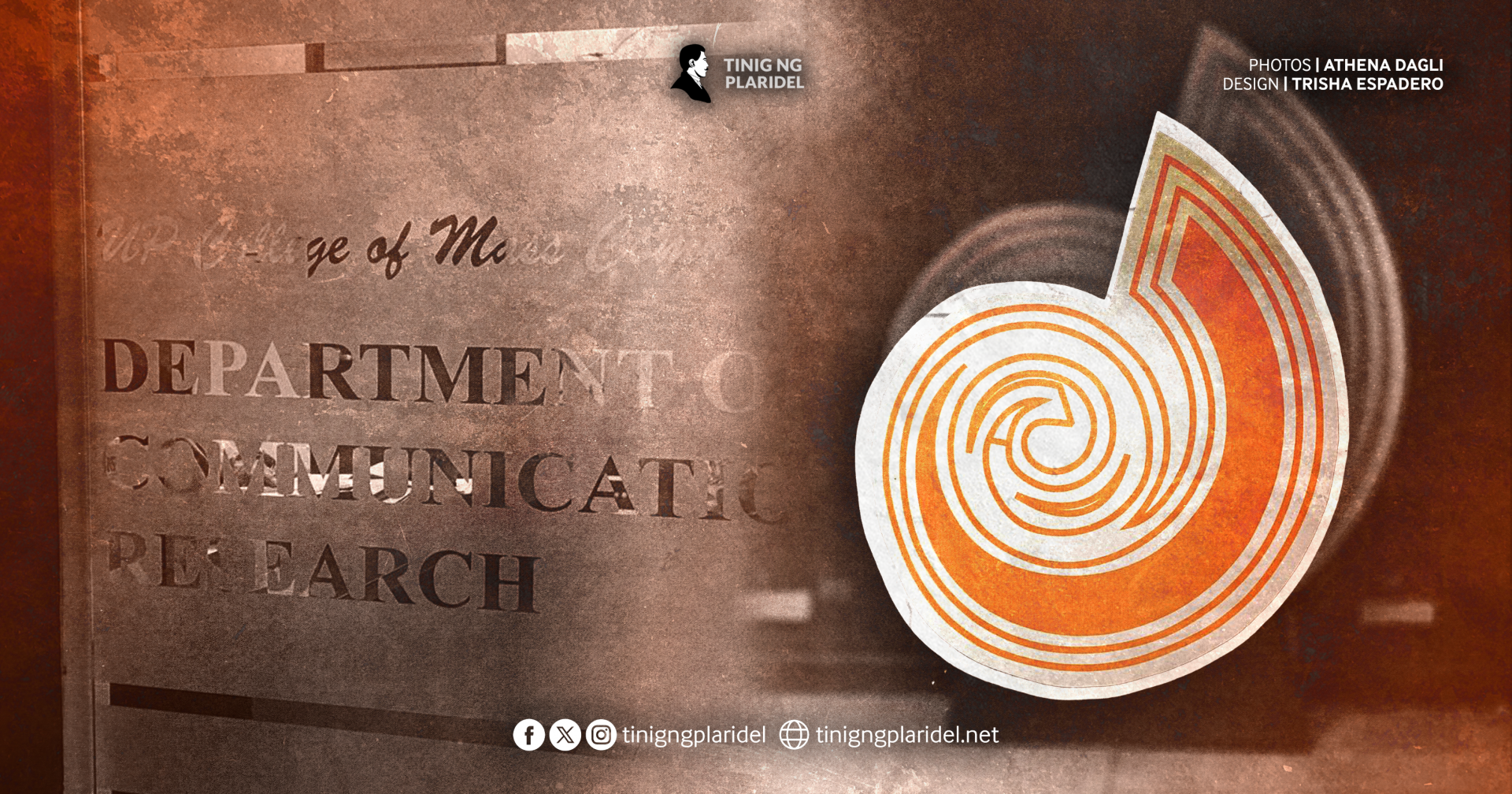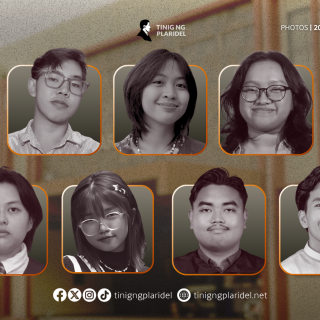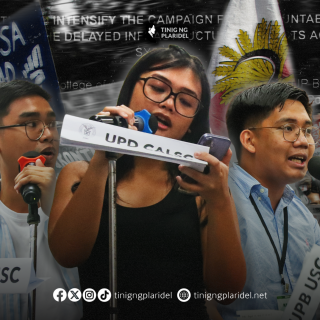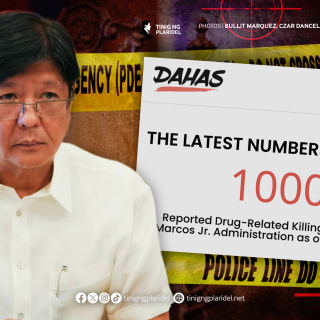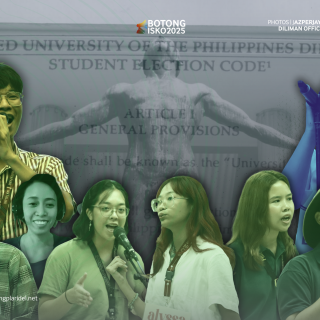Communication Research (CRes) students hope the incoming college administration provides greater financial support for those pursuing local and international conferences.
Although not part of their academic requirements, many CRes students seek to present their work at conferences beyond the university to enhance their portfolios and gain valuable research experience. However, financial constraints often hinder them from doing so.
While the college offers the CMC Enhancement Grant, it is often insufficient to cover the expenses of attending a research conference. Students also have to undergo a “complicated” application process to receive funding, said CMC Student Council CRes Rep. Kiel Fernandez.
While the admin is usually lenient in providing financial assistance, the grant has finite funds and is distributed on a first-come, first-served basis.
“Meron ngang grants […] pero P10,000 lang per team—at hindi lahat guaranteed na makakuha, lalo na pag-naubos na ang budget by the latter part of the year,” Fernandez said.
Former CMC Dean Fernando Paragas explained that the limitations of the college’s grant stem from the administration’s uncertainty about how much funding to request from UP.
“We don’t really know how many students will be going annually. We don’t have figures pa eh. […] Kung sasabihin mong magre-request na tayo agad, wala pa tayong data tapos biglang hingi ka nang maraming pera and then [kapag] under-utilized [ang funding], mapapagalitan ka naman,” he shared.
Interim Department of CRes (DCRes) Chair Julienne Baldo-Cubelo said that inadequate budget affects not only students but also faculty members.
“We know the predicament, the limitations, and the frustrations talaga. Impractical siya ‘pag wala ka pa talagang kinikita. Ideal siya, but even for faculty members, it’s a reality that you will produce a quality paper but you cannot [present outside], kahit merong mga support from the university,” she said in an interview with Tinig ng Plaridel.
Due to scarce resources, students are forced to solicit funds through the CMC Student Council’s social media pages, personal networks, or local government units.
CRes senior M.A.* faced this dilemma firsthand when they were offered a chance to present their research paper in Beijing, China.
While her team was supposed to receive the P10,000 grant from the college, they decided to forgo the opportunity, as the amount was not enough to cover expenses, such as the registration fees and travel and food allowances, among others.
“Sentimentally, may support naman ‘yung department, but the support through finance was lacking,” she said.
Likewise, JC Oboy, senior CRes student, has received the grant twice but observed the funding is not enough especially for research teams with multiple members.
“This budget is limited and, for some, might be insufficient, especially for groups since they will need to share a fixed amount among themselves,” he explained.
Baldo-Cubelo said that one of the department’s priorities for the administration is expanding the CMC Enhancement Grant.
“Sana ma-expand pa kung saan kukuha ng source ang CMC enhancement grant, kasi hindi lang siya actually for students. Sumasabay din ang faculty dyan ‘pag kailangan talaga. Sana ma-maintain ‘yan, sana lumawak,” she said.
During Paragas’s term, the administration earmarked P501,000 to the grant, P285,000 of which were released to students. The rest were given to faculty members, admin and Research, Extension and Professional Staff (REPs).
For the meantime, Baldo-Cubelo said students can participate in conferences spearheaded by the DCRes without having to shell out a lot of money.
These include the National Communication Research Conference, a local conference organized by the department that provides an avenue for young researchers, faculty members, and professional scholars across the country to present their work.
Its international counterpart, the Communication Research International Conference, was launched in 2016.
“Puwede niyong ma-experience ‘yung community, the necessary critique about your paper, the community of scholars who participate, nang hindi gumagastos tulad ng sa ibang international conference,” she said.
Bureaucratic organization processes
Beyond funding concerns, the department’s lone-home organization, the UP Communication Research Society (UP CRS) struggles with bureaucratic hurdles in room reservations, and limited access to college facilities.
“The time we spend going to different offices and waiting for their approval affects the timeline of our project implementation and adds the workload to the organizers,” said Oboy. “For example, Salikseek—UPCRS’ flagship project—is now designed to anticipate delays in room reservations.”
Oboy lamented needing to secure multiple signed letters from different offices and waiting for approvals, forcing their organization to account for delays when initiating a project. “There is a stringent policy for organizations who wish to reserve facilities intended for non-UP participants despite the event being fully UP administered,” Oboy added.
Despite these challenges, he said that Paragas was mostly supportive of their projects—whether by accepting invitations as forum speaker, collaborating on their programs, or offering financial support for certain events.
With the new administration, CRes students look forward to more conducive learning spaces, as the department currently has only one dedicated room.
“Unlike other departments, isa lang talaga ang dedicated room for CRes. Madalas, nakiki-gamit pa kami sa grad[uate] student area,” Fernandez lamented.
One suggestion is to keep the computer lab open during non-class hours, giving the students more workspace options. This recommendation is on the agenda for DCRes’ first department meeting on April 7, according to Baldo-Cubelo.
Amid the persisting concerns of DCRes, students expect the next dean to take initiative in pushing for tangible changes in funding and student welfare.
“I feel that the college must actively work toward increasing dialogues with organizations, collating their concerns and how we can collectively work around them moving forward, especially the issue of bureaucracy,” said Oboy.
For Baldo-Cubelo, the new dean must understand the departments’ regular operations and provide a listening ear to their upcoming plans and projects.
“If the dean’s office is literally and figuratively open, it makes administrative work much easier. Big things and little things, it matters that the dean’s office is accessible,” said Baldo-Cubelo.
*M.A. is the preferred name of one of the CRes seniors interviewed for this article.
This article is part of Tinig ng Plaridel’s #CMCDean2025 series, which examines the pressing issues faced by the Maskom community.

